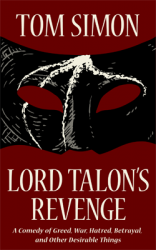My own essai on managing the length of epic fantasy, ‘Zeno’s mountains’, appears to have incited Marie Brennan to write a piece of her own: ‘How to write a long fantasy series’. This, in turn, inspired Patricia C. Wrede to write a two-part essay on ‘preventing epic bloat’: ‘Epics, part 1’ and ‘Epics, part 2’. If you are interested in epic fantasy and the writing techniques that pertain to it, I can recommend them all.
(Mary Catelli has also been good enough to leave a comment to the second part of Ms. Wrede’s essay, pointing the way back to ‘Zeno’s mountains’. I thank her for her thoughtfulness, and hope that some of Ms. Wrede’s readers may enjoy my little screed, in the brief time that remains to us. You see, closing a chain of links so early, by pointing back to the first URL in the chain, could cause the entire space-time continuum to collapse on itself. Or at least the Internet. You have been warned. By the time I get to say ‘I told you so’, it will be too late.)









Recent Comments